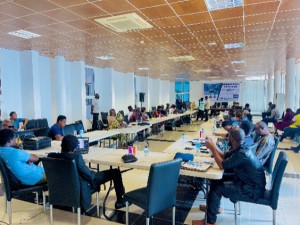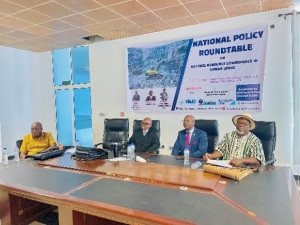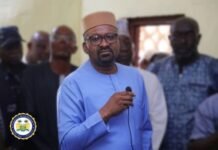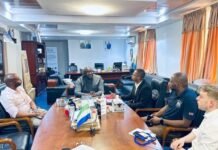By Foday Moriba Conteh
In a bid to pave the way for enhanced governance in the mining sector to tackle the exacerbated levels of inequality in mining communities across Sierra Leone, the Network Movement for Justice and Development (NMJD), in collaboration with the Integrated Social Development Centre (ISODEC), a Ghanaian-based development and civil society organization, with support from the Ford Foundation through ISODEC, successfully concluded a one-day National Policy Roundtable Dialogue on Natural Resource Governance.
The event, themed “Ending Inequalities in Sierra Leone’s Natural Resource Management,” took place on Tuesday, April 16, 2024, at the Bintumani Hotel on Aberdeen in Freetown.
Addressing the gathering, the Executive Director, Network Movement for Justice and Development (NMJD) Abu A. Brima emphasized the vital role of natural resources, which are not only essential for livelihoods but also for development. He highlighted the widespread interest in the topic, evident from numerous inquiries received prior to the event. He underscored the importance of addressing growing poverty and division, especially in communities affected by resource extraction.
The NMJD, in collaboration with the Integrated Social Development Center (ISO-TEC) in Ghana, shares a commitment to justice, social transformation, and empowerment processes. Despite efforts to engage in natural resource governance at regional and continental levels, Abu A. Brima noted persistent inequalities within the sector, particularly in areas where mining activities take place.
He stressed the need to manage natural resources as assets for development rather than sources of conflict and called for a collective effort to ensure that Sierra Leoneans benefit from their country’s resources, thereby reducing inequalities and promoting sustainable development.
The Executive Director of NMJD said that the roundtable aimed to galvanize stakeholders to address natural resource-related inequalities and explore strategies for inclusive resource management, furthering that expert presentations and discussions sought to foster dialogue on leveraging natural resources for equitable development and societal transformation.
Sam Danse, Executive Director of the Integrated Social Development Centre (ISODEC), underscored the importance of addressing inequalities within the extractive industry and championing a sustainable energy transition highlighting the significant potential of the extractive sector in driving economic growth, creating job opportunities, and reducing poverty in Sierra Leone.
However, Sam Danse emphasized the urgent need to tackle existing disparities, environmental degradation and the marginalization of communities where resources are located.
Recognizing Sierra Leone’s commendable performance in implementing the 2019 Extractive Industries Transparency Initiative (EITI) Standards, he stressed the crucial importance of ensuring that the benefits of natural resource extraction directly benefit local populations, especially in regions such as Kono, Koidu and Koinadugu.
He further underscored the significance of transitioning from fossil fuels to renewable energy sources in addressing historical inequalities and advancing sustainable development.
At ISODEC, Danse emphasized the importance of adopting a multi-stakeholder approach to ensure a fair and equitable transition to renewable energy. He encouraged collaboration between government, civil society, private sector entities, and local communities to address challenges and capitalize on opportunities presented by the energy transition.
He urged collective action at regional and global levels to enhance natural resource governance, promote full disclosure of contracts and establish unified policies on extractives and natural resource management across Africa.
During the roundtable, Sonkita Conteh Esq, among other presenters, presented on “Ending Inequalities in Sierra Leone’s Natural Resource Management,” shedding light on recent legislative changes and ongoing challenges in the country’s natural resource landscape.
He highlighted policy reforms aimed at promoting a more egalitarian future, including the Customary Land Rights Act 2022 and the Mines and Minerals Development Act 2022.
However, Sonkita Conteh also raised concerns regarding inconsistencies between certain laws, such as the divergence between the Customary Land Rights Act and the Mines and Minerals Development Act regarding surface rent to communities. He emphasized the need to make these laws work in practice to effectively address inequality.
In his keynote address, Minister of Mines and Mineral Resources, Julius Mattai, shared his personal connection to mineral resource governance, drawing on his academic background in mining and natural resource management. He acknowledged the presence of esteemed individuals, including mentors and colleagues, and emphasized the importance of collaboration in addressing sectoral challenges.
Commending the organizers, particularly the Network Movement for Justice and Development (NMJD) and its partners, for convening the timely roundtable discussion, Julius Mattai highlighted the significance of the event in fostering professional dialogue and generating ideas to empower communities affected by mining activities.
Underscoring the multidimensional nature of natural resource management, he noted its interconnectedness with various Government Ministries, Departments and Agencies. He stressed the need for sustainable, transparent, and efficient governance to address the diverse challenges facing Sierra Leone’s natural resources.
While primarily focusing on mining-related issues, the Mines Minister acknowledged concerns raised about the negative impacts of mining activities on communities. He urged caution against knee-jerk reactions, emphasizing the importance of thoughtful consideration and responsible decision-making.
He highlighted the importance of recognizing the broader spectrum of natural resources beyond mining urging attendees to consider the potential of other resources such as fisheries, forestry and coastal assets. Drawing a comparative analysis with Nepal, Minister Mattai underscored the significance of holistic resource management.
Addressing concerns about the dominance of mining in discussions, he emphasized the economic significance of the sector, citing substantial export revenues generated from minerals like iron ore and rutile. He also cautioned against calls for a complete ban on mining activities, stressing the sector’s contribution to the country’s GDP and balance of payments.
Furthermore, the Minister highlighted efforts to diversify the mining sector, citing the emergence of new commodities like lithium and heavy mineral sands. He emphasized the importance of effective governance and transparency in maximizing the benefits of resource extraction.
Addressing the debate on resource nationalism, he further advocated for a balanced approach that ensures local participation without hindering foreign investment and stressed the need for innovative strategies to enhance Sierra Leone’s role in the mining sector while maintaining a conducive environment for investment.
In conclusion, the Minister called for collective action to address issues such as illegal mining and environmental degradation, encouraging introspection and proactive engagement in tackling the challenges of natural resource management in Sierra Leone.
Other experts also made presentations on various topics, followed by panel discussions and recommendations on the theme: “Ending Inequalities in Sierra Leone’s Natural Resource Management,” which climaxed the ceremony.






